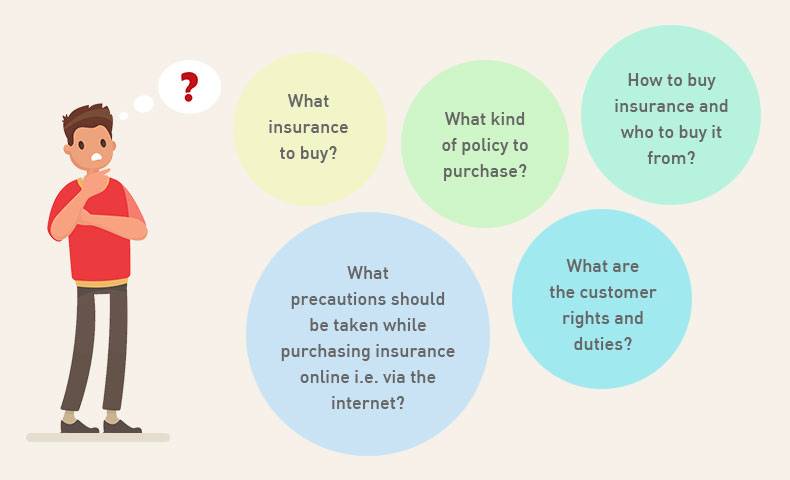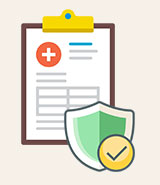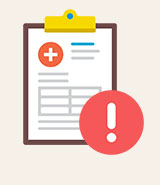Insurance is available for unpredictable events such as death, accident, sickness, loss or damage to motor vehicle, property etc. These are some of the risks against which you should protect yourself from and accordingly buy life insurance, personal accident insurance, health insurance, motor insurance, property insurance etc.
Chapter 10 Guidelines for a Customer
Insurance Quotient Boosters
- Insurance should be bought after thoroughly understanding our needs based on which life-stage we are at, what our plans for the future are and how many family members we have who depend on us.
- Insurance policies should only be bought from registered insurance companies, licensed insurance agents or licensed brokers. Their authenticity can be verified through IRDAI.
- As customers, we have certain rights and responsibilities before, while and after buying insurance.
There are several questions in our minds before we buy insurance.

What Insurance to Buy

The insurance policy that you buy must meet your requirements. This means you must first identify what our needs are. You must choose your life insurance policy depending on which life-stage you are in and your aspirations for the future. Insurance needs may differ depending on whether you are about to start a family or have growing children with education needs or want to plan for your retirement. You should join a health insurance scheme while young and ensure continuous coverage. While third party motor insurance is statutory, i.e., it is required under the Motor Vehicles Act 1998, it would be wise to buy a comprehensive motor insurance policy that covers damage to vehicle as well. Protecting house and contents against the risks of fire, flood and earthquake will secure your hard earned savings to meet your other financial needs instead of using them for rebuilding.
How do we buy insurance and whom do we buy it from?
A. Purchase insurance policies from the following:

- Registered Insurance Companies
- Licensed Insurance Agents (including corporate agents and micro-insurance agents)
- Licensed Insurance Brokers
B. Verify the genuineness of the person and entity before making any payment:

- Ask for an identity proof and particulars of IRDAI license of the person/ entity soliciting insurance
- Ask for the details of address and telephone number of the person and entity concerned, especially in case of telesales
- Check the IRDAI website to verify the details of insurance companies, brokers and web-aggregators and use the agent locator on the IRDAI website to check for agents.
If any unlicensed intermediary or an unregistered insurer solicits insurance, file an FIR with the police and intimate IRDAI. Any payment you make to such unlicensed intermediaries or unregistered insurers is at your own risk.
What are the customer rights and duties?
As a smart consumer, you should be aware of your duties and rights about your policy coverage, claims and grievance redressal. The rights and duties during various stages of the life-cycle of insurance policy are briefly discussed here:

- When you buy an insurance policy:
Fill the proposal form yourself correctly and truthfully. You will be responsible for any information in this document as it bears your signature.- Disclose “all material information” about the risk you want to cover.
- Ensure to register nomination under your policy. Fill the nominee’s name correctly.
- DO NOT LEAVE ANY COLUMN BLANK.
- DO NOT SIGN A BLANK PROPOSAL FORM.

- After you submit the proposal:
- Once the proposal is submitted, you should hear from the insurance company in 15 days about their decision on the issue or refusal of grant of insurance.
- If not, take up the matter in writing.
- If any additional documents are asked for, comply immediately.
- If the insurer refuses grant of insurance, it should be informed in writing with reasons.

- After you buy the insurance policy:
- The policy document should reach you within a reasonable period of time after the proposal is accepted by the insurance company.
- If not received, contact the insurance company regarding it.
- When policy document is received, check it and be sure that the policy is the one that you wanted.
- Go through all the policy conditions and be sure that these are the same that were explained to you by the intermediary/ insurance company official at the time of sale.
- In case of doubts, contact the intermediary/ insurance company official immediately for clarification.
- Wherever possible, contact the insurance company directly.

- Ensure that you are buying the right insurance by taking the following precautions:
- Be wary of unauthorized calls.
- Be suspicious in case of lucrative offers or low premiums; call the insurance company to check the credentials in case of doubt.
- Do not sign a blank insurance proposal form.
- Avoid paying premium in cash. Pay by cheque in favour of insurance company.
- Request for receipt as evidence of payment of premium.
- Examine the policy after receipt of the same and ensure that the requested coverage and premium terms are mentioned correctly.

